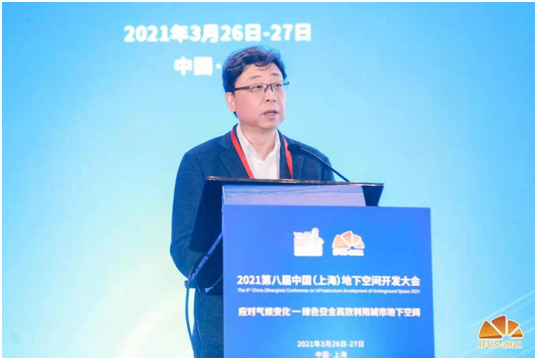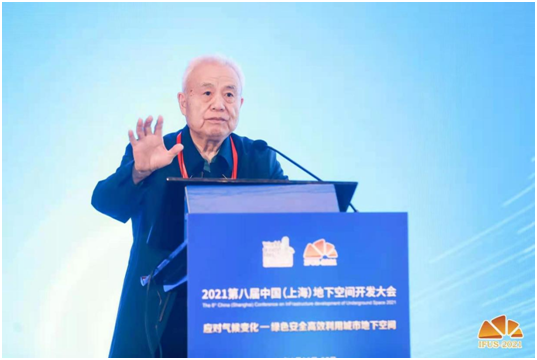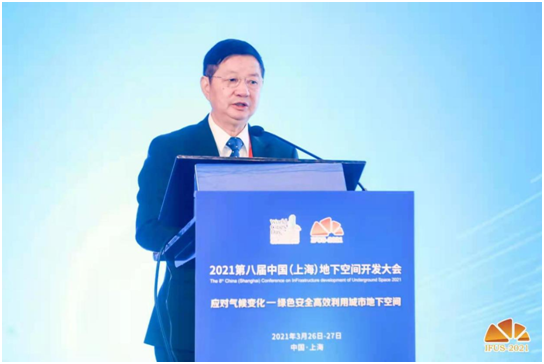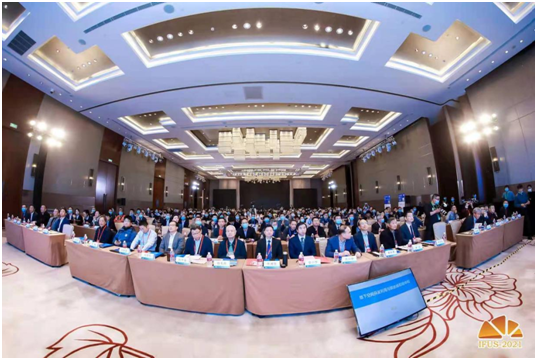The 8th China (Shanghai) Conference on Infrastructure Development of Underground Space, co-organized by Tongji University, Shenzhen University, the Municipal Engineering Branch of China Civil Engineering Society and the Associated Research Centers for the Urban Underground Space (ACUUS), was held in Shanghai on March 26-27. Focusing on the impact of global climate change, members of the Chinese Academy of Engineering (CAE) and the Chinese Academy of Sciences (CAS), experts, scholars, engineers, managers and business representatives from the circle of underground space development shared their views on how to make the best use of urban underground spaces in an eco-friendly, safe and efficient manner.
This event was attended online and offline by a broad spectrum of preeminent underground space experts from China, Switzerland, the Netherlands, Russia and other countries, as well as more than 100 leading figures from prestigious universities, research institutes, enterprises and institutions in China, including: Mr. QIAN Qihu, Honorary Chairman of the Conference, winner of the State Outstanding Science and Technology Award, member of CAE, and professor at the PLA Engineering University; Mr. CHEN Xiangsheng, Chairman of the Conference, member of CAE, and Dean of the College of Civil and Transportation Engineering, Shenzhen University; Mr. LIU Qianwei, Chief Engineer of Shanghai Housing and Urban-Rural Construction Management Committee; Mr. TONG Xiaohua, Vice President of Tongji University; and Mr. WANG Weidong, Mr. GU Guorong and Mr. CHEN Zhilong, who are China Design Masters for Engineering and Survey. With the number of on-site delegates topping 500, this Conference attracted more than 100,000 online viewers. Prof. XIE Xiongyao from the College of Civil Engineering, Tongji University served as the Director of the Expert Committee of the Conference.
On behalf of the entity providing guidance over this event, Mr. LIU Qianwei said in his opening remarks that the orderly development and utilization of underground spaces, as an important part of urban spaces, allows efficient use of land and energy, helps improve the production environment and boasts such intrinsic merits as good adaptability and thermal stability, which are crucial to the mitigation of climate change. As one of the "World Cities Day" celebration events, he added, the purpose of this Conference is to build a high-profile and influential platform for sharing first-hand information and frontier technology, and to explore and echo the strategic goal put forth by the United Nations to build inclusive, resilient and livable cities from the perspectives of urban development and professional experience. He stressed that 2021 marks the first year of the "14th Five-Year Plan" period, and Shanghai will attach greater importance to the development and utilization of urban underground spaces and push for the sustainable development of Shanghai in a safer, more efficient, neater and more harmonious way.

Mr. LIU Qianwei delivering a speech
On behalf of the conference organizer, Mr. TONG Xiaohua said in his opening remarks that climate change, as a hot topic of our times, has led to unprecedented impacts on a global scale, and that underground spaces, as the continuation and expansion of ground spaces, not only spearhead three-dimensional urban development but also spur lifestyle changes. Over the years, he added, Tongji University has been keeping a close eye on the scientific development and rational use of urban underground spaces, pushing for the high-quality and sustainable development of cities, contributing new ideas, novel theories and cutting-edge technologies to the growth of the underground space industry, and facilitating the exchanges and cooperation between technology and industry, thereby playing a pivotal role in this industry. He called upon the participating CAS/CAE members and experts to bolster the academic development of Tongji University with insightful opinions and suggestions and to assist in the leap-forward development and utilization of China's urban underground spaces through fruitful academic exchanges at this Conference.

Mr. TONG Xiaohua delivering a speech
Mr. QIAN Qihu, CAE member and Honorary Chairman of the Conference, and Mr. CHEN Xiangsheng, CAE member and Chairman of the Conference, elaborated on the national strategy of and the global demand for "Peak Emission & Carbon Neutrality" with two speeches titled "Underground Space Development and Peak Emission & Carbon Neutrality" and "Low-carbon Strategy for and Practices in the Construction of Underground Spaces".
Mr. QIAN Qihu argued that with population soaring across the globe, the sprawling cities are cramming into green spaces above the ground, and putting relevant facilities into the underground spaces would help free up the ground spaces and forge a green and eco-friendly environment, which would be deemed as the biggest negative emission and the greatest contribution to all mankind. He added that by capturing the carbon dioxide emissions from industrial, power generation and transportation sectors and then injecting them into the underground spaces for carbon sequestration, it will not only contribute to China's drive to achieve "Peak Emission & Carbon Neutrality" but also help contain land subsidence.

Mr. QIAN Qihu delivering a speech
Citing Shenzhen Metro, the first subway in China to use solar energy and now gearing up for the utilization of geothermal energy, Mr. CHEN Xiangsheng introduced the audience to the low-carbon strategy for and the practices in the construction of underground spaces, and stressed the necessity of promoting low-carbon construction and low-carbon full-life-cycle operation and maintenance of the integrated transportation hub of Guangdong-Hong Kong-Macao Greater Bay Area. By building a digital twin platform underpinned by intelligent perception and IoT tunnel structure and achieving scenario-based intelligent management, he added, we can minimize the waste amid the construction processes and ensure low-carbon and reliable operation of infrastructures during their entire life cycle.

Mr. CHEN Xiangsheng delivering a speech
This two-day Conference featured 37 keynote speeches focusing on hot topics such as the intensive utilization of three-dimensional transportation and underground spaces, the intelligent construction, operation and maintenance of underground spaces, the development and utilization of deep underground spaces and key technologies, the construction of underground disaster prevention and mitigation systems, and the development strategy for future urban underground spaces. Based on the underground space development cases in global cities such as Shanghai, Beijing, Guangzhou, Shenzhen, Nanjing, New York, San Francisco, Rotterdam, Montreal, etc., participants exchanged views on how to bolster the high-quality development of urban underground spaces.

The Conference also featured a variety of parallel activities aimed to display the new technologies, new techniques and new equipment from the underground space industry, and a field trip to the Suzhou Creek Deep Tunnel (Yunling West) Project in Shanghai. As a precautionary megaproject rolled out by Shanghai, the SS1.2 experimental section of Suzhou Creek Deep-water Drainage, Regulation and Storage Project, applauded as Shanghai's "Super Regulation and Storage Corridor", is of monumental strategic significance for Shanghai's resolve to advance ecological civilization and to build itself into a world-class international metropolis.
As highlighted by the conference sponsor, the green, safe and efficient use of urban underground spaces is, against the overwhelming backdrop of global cities sparing no effort to grapple with climate change, not only an inevitable trend in addressing the challenges posed by climate change but also a realistic need in building resilient cities. The successful holding of this Conference will prompt further theoretical and practical research into the new paradigms and novel technologies for developing urban underground spaces, and is of great significance for developing the discipline of urban underground space, revving up the academic cooperation and exchanges with related disciplines, and achieving the green, safe and efficient use of urban underground spaces.
Participating entities include prestigious higher-learning institutions such as Tongji University, Shenzhen University, Shanghai Jiaotong University, Southwest Jiaotong University, Army Engineering University of PLA and Saint Petersburg State University, and leading enterprises such as Arcplus Group PLC, SGIDI Engineering Consulting (Group) Co., Ltd., PowerChina Huadong Engineering Corporation Limited, Shanghai Urban Construction Design and Research Institute (Group) Co., Ltd., Tongji Architectural Design (Group) Co., Ltd., Guangzhou Metro Design & Research Institute Co., Ltd., China Railway Engineering Equipment Group Co., Ltd., MCC Capital Engineering & Research Incorporation Limited, Herrenknecht AG, Shanghai Municipal Engineering Design and Research Institute (Group) Co., Ltd., Beijing Municipal Institute of City Planning & Design, etc.